A ‘Prophecy’ Worth Watching
Theater, which at its best makes us more human and humane, has become increasingly mediocre, produced as spectacle or driven by the presence of Hollywood celebrities.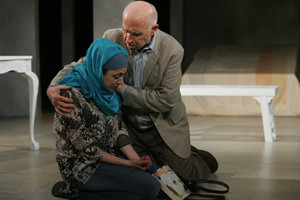
Orson Welles and John Houseman were preparing to mount a production in June 1937 in New York City called “The Cradle Will Rock,” a musical written by Marc Blitzstein and set in “Steeltown USA.” The musical followed the efforts of a worker, Larry Foreman, as he attempted to unionize steelworkers. His nemesis was the heartless industrialist Mister Mister, who owned the steel mill and controlled the press, the church, local civic groups, politicians, the arts and the local university, where, as a trustee, Mister Mister made sure the pliant college president fired professors who did not laud the manly arts of war and capitalism. “The Cradle Will Rock” spared no one, from Mister Mister’s philanthropic wife and spoiled children to Reverend Salvation, who preached war in the name of Jesus, to feckless artists who devoted themselves to the cult of art. At one point the artists, along with Mister Mister’s wife, sing:
And we love Art for Art’s sake,
It’s smart, for Art’s sake,
To Part, for Art’s sake,
With your heart, for Art’s sake,
And your mind, for Art’s sake,
Be Blind, for Art’s sake
And Deaf for Art’s sake,
And dumb, for Art’s sake,
They kill, for Art’s sake,
All the Art for Art’s sake.
The show was scheduled to open at the Maxine Elliott Theatre with an elaborate set and a 28-piece orchestra. But Washington, bowing to complaints, at the last minute announced that no new shows would be funded by the theater project until after the fiscal year. The theater was surrounded by armed guards since, the government argued, props and costumes inside were government property. Welles, Houseman and Blitzstein — who would later be blacklisted — rented the Venice Theater and a piano. They met the audience outside the shuttered Maxine Elliott Theatre and marched the theatergoers and the cast 20 blocks to the Venice. They invited onlookers to join them and filled the 1,742-seat house. Actor’s Equity had forbidden the cast to perform the piece “onstage” so the actors stood in the audience singing across the seats. The poet Archibald MacLeish, who attended, thought it was one of the most moving theatrical experiences of his life.
“This was censorship by another form,” the head of the Federal Theater Project, Hallie Flanagan, noted acidly at the time. By 1939 the Federal Theater Project was killed. It was the first of the Works Progress Administration (WPA) projects to be dismantled, “a reminder,” the playwright Karen Malpede said, “of the power of the theater.”
The corporate and government censorship — practiced in the name of sponsorship — that was imposed on “The Cradle Will Rock” is the censorship that has decimated the arts, the universities, the press and the church and destroyed the theater. These liberal institutions have been bought off. Corporate money, grants and government support reward those who stay on script, who do not challenge the cruel structures of American imperialism, our permanent war economy and unfettered capitalism. And those productions that break the rules are tossed aside. It is this kind of insidious censorship that takes cutting-edge productions, such as Malpede’s fierce new anti-war play, “Prophecy,” running at the Fourth Street Theater in the East Village in New York City until June 20, and relegates them to obscurity.
“Prophecy,” which has a superb cast including veteran stage actors Kathleen Chalfant and George Bartenieff, as well as the versatile Najla Said, examines the hollowness of our own imperial virtues. It explores the psychic and physical pain of war. Malpede’s play is perhaps too ambitious in its sweep, encompassing Vietnam, the wars in Lebanon and the occupied territories in Israel and Iraq. The writer in me would edit it down to focus on the war-tossed relationship between Hala, a Muslim woman; her former lover, Alan; Alan’s wife, Sarah; and Alan and Hala’s daughter, Mariam. But “Prophecy” goes to places most modern theater productions will not. It has a conscience. And “Prophecy” keeps alive the tenuous link with productions, including “The Cradle Will Rock,” that prize truth. It speaks in the unfamiliar language of justice.
“What happened?” Malpede asked when we spoke. “The Vietnam War finally ended, but the peace movement persisted in large numbers through the dirty wars in South America and the growing anti-nuclear movement. Yet, it became more and more difficult to produce socially conscious, poetic theater. The old dogma of the 1950s reasserted itself: Art and politics don’t mix. When Ronald Reagan was elected [as president] in 1980, he immediately ordered National Endowment of the Arts grants to small — read leftist — theaters be abolished. Reaganism eroded the public perception that a great democracy deserves great art.”
“Without government support for funding innovation and the non-commercial, the theater began to institutionalize and to censor itself,” Malpede went on. “The growing network of regional theaters became ever more reliant upon planning subscription seasons which would not offend any of their local donors, and the institutional theaters began to function more and more as social clubs for the wealthy and philanthropic. Sometimes, there was a breakthrough. ‘Angels in America’ was one — the result, too, of an aggressive gay activist movement. But to a large degree, the theater no longer wanted to shake people up. The institutional theaters began to ‘develop’ plays — a process geared to securing grants from the few foundations which still, in our age of austerity, fund the arts. Development means that most new plays receive a series of readings and workshops during which all sorts of dramaturges, literary managers, directors and artistic directors give their ‘input,’ most often thoroughly confusing especially young playwrights and frequently damaging whatever was authentic to begin with. Fewer and fewer of these plays ever reach production. As the economy worsens, fewer and fewer risks are taken. Some subjects are out of bounds altogether, including strong critiques of capitalism or American foreign policy; in other words, anything that might cause individual donors to stop donating.” Theater, once again unplugged from what gave it vitality, withered. It became increasingly mediocre, produced as spectacle or driven by the presence of Hollywood celebrities. Audience numbers have dwindled and aged. Critical debate on stage is largely banished. Theater criticism, as much of a curse as a blessing given the orthodoxy imposed by newspapers such as The New York Times, is vanishing with the death of newspapers. And when the dinosaurs do bellow, as they did when The New York Times reviewed “Prophecy,” they often hold up the artistic ideal parodied in “The Cradle Will Rock.”
“With the effective disempowering of artists, and with artists’ collusion in their own disempowerment, the theater now serves no meaningful function,” said Malpede. “It seldom startles, enlivens, enrages, or encourages its audience to become more fiercely aware of their own or of others’ humanity.”
Mariam, played by Said, returns from Lebanon as a young woman to meet her biological father, Alan, an American Jew who runs an international relief agency. She and her mother, Hala, also played by Said, left the United States for Beirut shortly after she was born. Mariam enters her father’s office clutching a handbag tightly to her chest.
Mariam
I see. I thought it would be nice if you knew me, if you understood everything in your last minutes, if your whole life flashed before you, and you got to know at the very last moment that this child who was supposed to bring in the new world, only you never got to watch her grow up, unfortunate, that, but there was always a war on, after all, and how could you leave your important job to go there, anyway. It was always so unsafe. But, I wanted you to know, now, at last, about the new world you made with your big dreams, your empty words, and the murderous actions they cover up, the peace plans, the road maps running every which way, they have to bulldoze so many houses to get there, and put up such a big wall, build a fence around Gaza, such a nice prison they built, to keep the fishermen from being able to fish, and there is no where to run, you get blown up if you go to the beach, if you leave, you can’t get back in, and, then, why not send Lebanon back to the stone age, the people, after all, are so primitive. But none of that matters, now, at all, because most of all I wanted to see your face at the moment you understand it is your own flesh who is going to blow you up.
At this, Alan makes a lunge for her, and he grabs her bag.
Mariam
I wouldn’t open the clasp.
He stands frozen, holding the bag away from him, not knowing what to do. Mariam laughs.
Mariam
We are all terrorists, after all.
She takes the bag away from him.
Alan
Forget about me. I’m an old man. Don’t ruin your life.
Mariam
Get ready, Alan. I’m going to give you a treat. Parents are always already dead. They don’t get to hear this:
Mariam begins to recite the Kaddish.
Yeetgadal v’yeetkadash sh’mey rabbah
B’almach dee v’rah kheer’utey
V’yanleekh malkhutei, b’chahyeykhohn, uv’ yohmeykhohn
Uv’chahyei d’chohl beyt yisrael
Alan freezes. Mariam opens the bag and dumps its contents onto the floor: lipsticks, pens, her passport, a diary, a wallet, keys, the usual stuff, a book. Alan feels like a fool, but he relaxes. Mariam picks up the book.
Mariam
See Under Love by David Grossman. A great Israeli novelist. A great Holocaust book. And do you know that David Grossman had a son, Uri. He was a tank commander in the ground invasion. His father had just signed a petition with other Jewish intellectuals calling for an end to the fighting. This war could have ended before Uri Grossman got killed by a Hezbollah rocket. He was twenty years old. And you think we are the only ones who love to make martyrs? Do you think we are the only ones who love death?
“What is to be done?” Malpede asks. “Here I speak only from experience. ‘Prophecy’ had six public readings, each packed with attentive and wildly enthusiastic audiences, yet was refused production by every theater that hosted these readings and by others to whom the play was sent. One producer called the play ‘brilliant’ but told me it was ‘too risky’ and he would ‘never produce’ it at his theater. His was among the most honest responses. Another producer told me she found the play ‘very moving’ when she read it, but is of the opinion that neither critics nor audiences wish to ‘see anything about anything.’ Another potential producer, who, after witnessing 150 people at the Kennedy Center become totally engrossed in a reading and hearing their amazingly positive feedback afterwards, wrote me, coolly, that he ‘had received negative emails’ and withdrew his offer to consider the play.
“George Bartenieff, my partner, and I decided we had to produce the play ourselves. We had developed a devoted core audience, and the play had no trouble attracting wonderfully talented actors. In fact, I had written it for Najla Said and Kathleen Chalfant, and both were eager to do it. Najla went to London, where ‘Prophecy’ premiered in a co-production, which we partially funded, mainly from a small pension fund of mine left over after I had been denied tenure at the Tisch School of the Arts for ‘being an artist,’ not a postmodern theorist.
“Bartenieff and I maintain a small not-for-profit organization, Theater Three Collaborative, just for the purpose of creating the sort of poetic, social theater we revere. We had already produced ‘The Beekeeper’s Daughter,’ about a Bosnian refugee, and ‘I Will Bear Witness,’ based on the Victor Klemperer diaries. After London, we set about raising the money, and finally completely depleting my pension, to produce ‘Prophecy’ in New York.”It is only when artists control their own work that great socially relevant theater can be sustained. The funding for this kind of work will never come out of the world of corporate sponsorships. Corporations see theater and the arts as a diversion. Great theater will never find support among liberal institutions that have become tools, as “The Cradle Will Rock” pointed out, of the power elite.
“The theater needs to be funded with public money, as it was in Athens, where it began, and where all citizens were required to attend the dramatic festival, because the theater is, when it functions, a corrective against the excesses of empire,” Malpede says. “As such it remains necessary to the functioning of a democratic state and though it might make the functionaries of such a state uncomfortable, it will and must be a beacon of truth. At its best, such a theater provides the experience of heightened feeling, heightened aliveness, heightened awareness of self and other. It makes us more human and humane, and, therefore, more able to take action in the world.”
Editor’s note: To see video clips from “Prophecy” and interviews with Karen Malpede and others associated with the play, click here.
Your support matters…Independent journalism is under threat and overshadowed by heavily funded mainstream media.
You can help level the playing field. Become a member.
Your tax-deductible contribution keeps us digging beneath the headlines to give you thought-provoking, investigative reporting and analysis that unearths what's really happening- without compromise.
Give today to support our courageous, independent journalists.

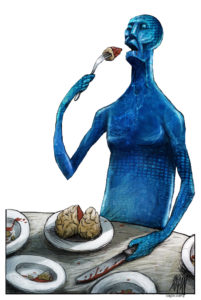
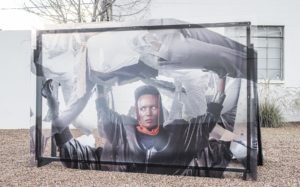
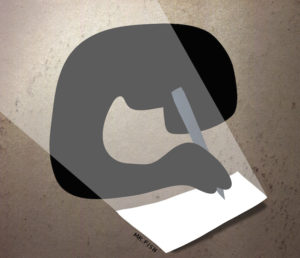

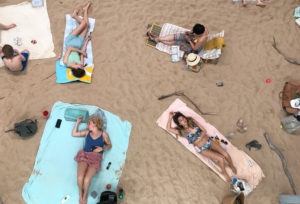
You need to be a supporter to comment.
There are currently no responses to this article.
Be the first to respond.